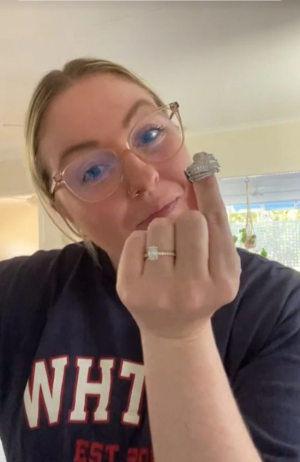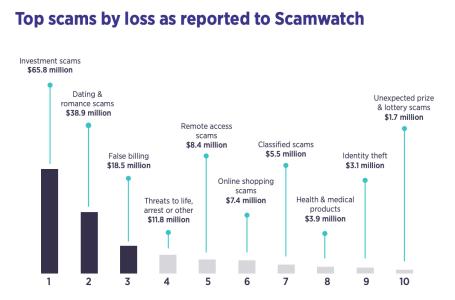Scam Alert: Unbelievable! Aussie Victim Receives Strange 'gift' from Fake Website Scammers
- Replies 10
The internet is a fantastic resource which can make life easier for us all, especially as we get older. It can open up the world to us from the comfort of our own homes, enabling us to keep up with family and friends, catch up on the news, have a spot of online shopping, as well as partake in other activities such as streaming the latest movies.
However, while it has plenty of advantages, it has also become a hotspot for criminals – online fraudsters, phishers, scam-artists and the like – who are always looking to take advantage of unsuspecting victims across the country.
Recently, a small-business owner from Queensland was unfortunate. She fell victim to an online scam after purchasing clothing from a fake website that had been created to mimic an Australian fashion retailer.
Camille Warfield was shopping for an item that was no longer available in store and so she resorted to searching the web for an alternative source. A link she had clicked on seemed like the perfect find, claiming to be an official store for a popular Australian fashion retailer – DECUJBA – with a 'too-good-to-be-true' end-of-financial-year sale advertised on the website.
After she made the purchase, an email confirmation she received indicated that all may not be as it had seemed. It had been a dodgy order confirmation with slight discrepancies that would have been fairly obvious to any experienced online shopper.
Unfortunately, by the time the scam was detected it had been too late for Ms. Warfield. She had already authorised the payment to the fake website and was unable to cancel or receive a refund from the bank.
She was, however, surprised a few weeks later to receive a package from Australia Post. Upon opening it, she was shocked to find an inexpensively-made jewellery box with a tiny ring inside. It had been sent to her from the scammers as a ‘gift’, if you can call it that.
In a social media post, Warfield said, 'This is a story about how I got scammed. I’m not someone that gets scammed easy … Anyway joke’s on me.'
'If I had known that copycat websites were a thing, then I would have been a little bit more suspicious,' she added.
The incident is a reminder to all our members to never rush into making a purchase online – always do your own research and double-check that you are buying from the correct website before committing to a purchase.
The Australian Competition and Consumer Commission’s Scamwatch website, has more information and advice for consumers when it comes to online shopping, as well as tips to help you identify if a website or online profile is indeed fake.
Here are simple tips to protect yourself from falling into the same trap as Ms. Warfield:
One surefire way to verify the legitimacy of a website is to look at the URL address. Fraudulent websites will often have smudgy discrepancies in their URL addresses that may not align perfectly with the trusted official store's website link. It might include weird characters, misspelled words or, in Camille Warfield's case, a very slight difference that's only detected if you're looking for it.
Secure websites often have their URL starting with 'https', with the 's' indicating that the site uses encrypted data transfer for utmost security. If a site has just 'http' it doesn’t mean it's fake but it's wise to be cautious when you're considering financial transactions there.
Next, the lack of contact information or a physical address on a website is another red flag to consider. Real businesses intend to build trustworthy relationships with their customers and generally make it easy for them to get in touch. In stark contrast, scammers usually try to be as untraceable as possible, hoping to fade into the internet's background noise as soon as they've grabbed your hard-earned cash.
Checking website's reviews, customer's testimonies, or doing a quick search about the store's reputation can also be helpful. Online platforms like Trustpilot provide independent website reviews from real users.
Finally, if the site is riddled with poor grammar, shoddy designs, and low-quality images, it should set some alarm bells ringing. Most respected retailers will invest in professional-looking websites as a testament to their credibility and legitimacy.
All this might sound like a lot of work, but it's far less onerous than trying to recoup losses from a dodgy transaction. Always take your time before making any online purchase, as rushing into these transactions often leads to regret. Remember, no deal is worth risking your hard-earned cash – stay vigilant online!
What did you think of this story, members? Has anything like this ever happened to you? Let us know in the comment section below!
However, while it has plenty of advantages, it has also become a hotspot for criminals – online fraudsters, phishers, scam-artists and the like – who are always looking to take advantage of unsuspecting victims across the country.
Recently, a small-business owner from Queensland was unfortunate. She fell victim to an online scam after purchasing clothing from a fake website that had been created to mimic an Australian fashion retailer.
Camille Warfield was shopping for an item that was no longer available in store and so she resorted to searching the web for an alternative source. A link she had clicked on seemed like the perfect find, claiming to be an official store for a popular Australian fashion retailer – DECUJBA – with a 'too-good-to-be-true' end-of-financial-year sale advertised on the website.
After she made the purchase, an email confirmation she received indicated that all may not be as it had seemed. It had been a dodgy order confirmation with slight discrepancies that would have been fairly obvious to any experienced online shopper.
Unfortunately, by the time the scam was detected it had been too late for Ms. Warfield. She had already authorised the payment to the fake website and was unable to cancel or receive a refund from the bank.
She was, however, surprised a few weeks later to receive a package from Australia Post. Upon opening it, she was shocked to find an inexpensively-made jewellery box with a tiny ring inside. It had been sent to her from the scammers as a ‘gift’, if you can call it that.
In a social media post, Warfield said, 'This is a story about how I got scammed. I’m not someone that gets scammed easy … Anyway joke’s on me.'
'If I had known that copycat websites were a thing, then I would have been a little bit more suspicious,' she added.
The incident is a reminder to all our members to never rush into making a purchase online – always do your own research and double-check that you are buying from the correct website before committing to a purchase.
The Australian Competition and Consumer Commission’s Scamwatch website, has more information and advice for consumers when it comes to online shopping, as well as tips to help you identify if a website or online profile is indeed fake.
Here are simple tips to protect yourself from falling into the same trap as Ms. Warfield:
One surefire way to verify the legitimacy of a website is to look at the URL address. Fraudulent websites will often have smudgy discrepancies in their URL addresses that may not align perfectly with the trusted official store's website link. It might include weird characters, misspelled words or, in Camille Warfield's case, a very slight difference that's only detected if you're looking for it.
Secure websites often have their URL starting with 'https', with the 's' indicating that the site uses encrypted data transfer for utmost security. If a site has just 'http' it doesn’t mean it's fake but it's wise to be cautious when you're considering financial transactions there.
Next, the lack of contact information or a physical address on a website is another red flag to consider. Real businesses intend to build trustworthy relationships with their customers and generally make it easy for them to get in touch. In stark contrast, scammers usually try to be as untraceable as possible, hoping to fade into the internet's background noise as soon as they've grabbed your hard-earned cash.
Checking website's reviews, customer's testimonies, or doing a quick search about the store's reputation can also be helpful. Online platforms like Trustpilot provide independent website reviews from real users.
Finally, if the site is riddled with poor grammar, shoddy designs, and low-quality images, it should set some alarm bells ringing. Most respected retailers will invest in professional-looking websites as a testament to their credibility and legitimacy.
All this might sound like a lot of work, but it's far less onerous than trying to recoup losses from a dodgy transaction. Always take your time before making any online purchase, as rushing into these transactions often leads to regret. Remember, no deal is worth risking your hard-earned cash – stay vigilant online!
What did you think of this story, members? Has anything like this ever happened to you? Let us know in the comment section below!










